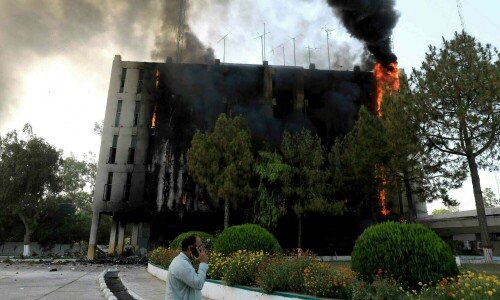ISLAMABAD: While the first three-year term of National Commission for Minorities (NCM) has expired, the government has failed to approve law for the establishment of the commission as an autonomous body.
“As long as the legislation regarding NCM is not enacted, not only the whole commission but the religious minorities in Pakistan will remain like orphans,” said Chela Ram Kewlani in his last address as chairman of the NCM.
The farewell meeting of the commission was held here on Thursday. Speaking on the occasion, Mr Kewlani expressed disappointment and said the first bill, “National Commission for Minorities Act 2015”, was presented in the National Assembly in 2015 and it could not sail through the lower house.
While the NCM was established 27 years ago, it has always been like a committee under the Ministry of Religious Affairs.
However, in 2020, the then minister for religious affairs Pir Noorul Haq Qadri took the lead by establishing the NCM headed by a non-Muslim even without a law in this regard.
Bill was tabled in National Assembly in 2015 but could not sail through, says outgoing chairman
In February this year, Finance Minister Senator Ishaq Dar introduced the National Commission for Minorities Bill 2023 in the National Assembly. The bill has been referred to the relevant committee for further deliberation.
Meanwhile, addressing the farewell meeting of the NCM, Mr Kewlani said the commission with its limited powers took up matters related to forced religious conversions, issues related to the properties belonging to minorities, security of places of worship of minorities, reserved seats and quota for minorities in government institutions and educational institutions.
Mr Kewlani added that the commission had suggested to the government to celebrate major festivals of all religious minorities at the official level, including Diwali, Holi, Easter and Nowruz.
“But the most important work that the commission has done is to strive for legislation for minorities over various issues because I think that without legislating minorities are left helpless and powerless to fight for their cause,” he added.
The speakers in the farewell speech said the commission did what the representatives of the minorities should do.
The members of the commission held meetings with high government officials and members of aggrieved communities in remote districts in all four provinces.
The members of the commission visited all temples, churches, other places or individuals that faced terror or mob attacks.
The 12-member commission included two Muslim members, three each from Hindu and Christian communities, two members from the Sikh community and one member each from the Parsi and Kalash communities.
The meeting was attended by Dr Jaypal Chhabria, Mufti Gulzar Naimi, Vishnu Raja, Dr Sara. Albert David MBE, Dr Mampal Singh, Saroop Singh, Roshan Khursheed Brocha, Dawood Shah and Dr Liaquat Masih Qaiser. The meeting was told that members of the commission did not take their salaries during their three-year tenure nor did they availed of other facilities like travel and other allowances.
The meeting was also attended by Minister for Religious Affairs and Interfaith Harmony Senator Mohammad Talha Mehmood.
Published in Dawn, April 28th, 2023














































